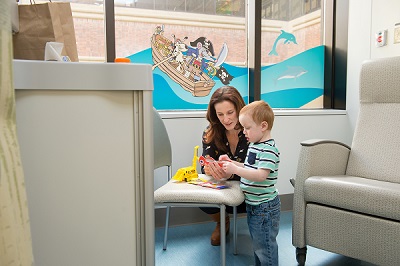
The stress of surgery can take its toll on the kidneys, regardless of a patient's age or the reason for their surgery.
"Acute Kidney Injury (AKI) happens in many populations, across different types of care, in all countries," said University of Alberta pediatric nephrologist Catherine Morgan. "But children having cardiac surgery are especially at risk."
Somewhere between 30 and 60 per cent of children who undergo heart surgery experience AKI, a sudden decline in kidney function. As a result, patients tend to spend more time in hospital, require ventilation for longer, and have a higher mortality rate.
Morgan explains that the condition also makes it harder for clinicians to dose medication or manage a patient's fluids and nutrition after surgery. At the moment, AKI is usually discovered through blood tests or if there is difficulty managing a patient's fluids after surgery. "Right now, we don't have a good way of picking it up early-only when large changes have already happened."
"The big question that remains is if this injury is entirely recoverable or if it creates long-term change that affects them as adults," Morgan said. One possibility is that children who suffer kidney injury after surgery may be prone to developing chronic kidney disease later on, which can have many negative health consequences.
Morgan wants to find ways to identify children at high risk of AKI in order to intervene sooner. "If we could predict AKI even a couple of hours earlier, we might be able to change the outcomes for some of the kids," she said. In 2016, she conducted a study with colleagues in the Division of Pediatric Cardiac Surgery, and at the Stollery Children's Hospital intensive care unit, that used near infrared spectroscopy (NIRS) to measure levels of oxygen and blood flow in a patient's kidneys during surgery.
Preliminary research findings suggest that moderately lower levels of blood flow in the kidneys might protect against AKI. If this is the case, it may be possible to lower a patient's risk with medical management before or during surgery. Morgan explains that further research can be done to explore treatments that recreate a similar environment in the kidney. Results also suggest that this kind of monitoring may be useful as an additional tool to help predict kidney injury.
Morgan is also exploring the long-term health impacts of AKI and is co-leading a study of critically ill children-including pediatric cardiac surgery patients-in Edmonton and Montreal. Like her other work, this project isn't just focused on answering immediate research questions, but building research collaborations that will endure.
"If you want to address intervention questions and long-term outcomes, you really need collaboration across multiple departments and hospitals. I think it's important for us to build networks not just for ourselves, but for others researching in the same areas," she said.
Ultimately, sick kids benefit from a critical mass of research. "There's real opportunity to change the outcomes for these kids."